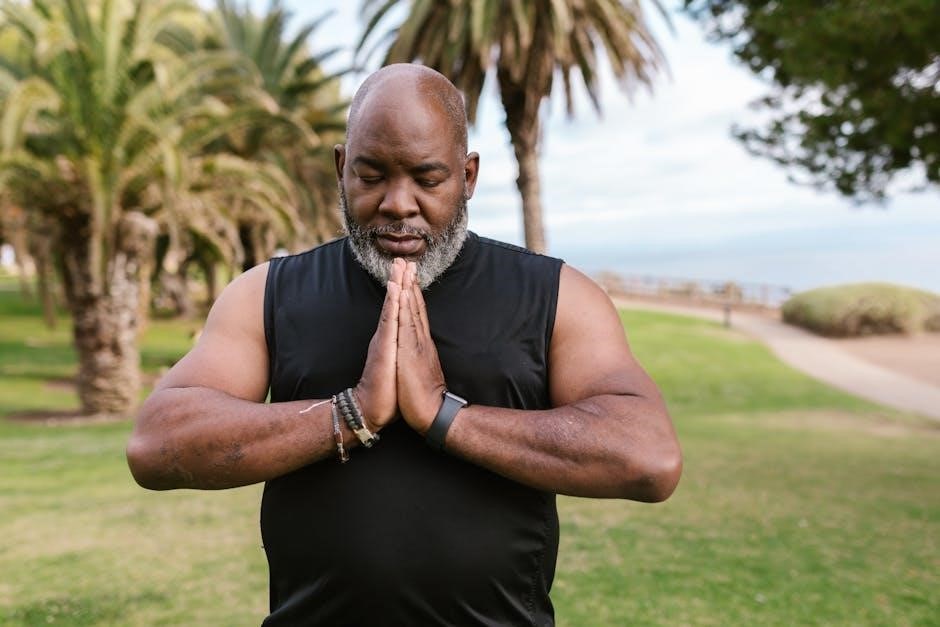
Deacon training in the Black Church is a vital ministry blending historical context with modern practices. It equips leaders to serve effectively, ensuring spiritual growth and community impact;
Overview of the Importance of Deacon Training
Deacon training is essential for effective ministry, ensuring leaders are equipped to serve with integrity and wisdom. It fosters a deep understanding of biblical principles, leadership skills, and community engagement. Proper training enhances the deacon’s ability to support pastors, manage church affairs, and address congregational needs. Without trained deacons, the church risks inefficiency and disunity. Deacon training also promotes accountability, ensuring that leaders uphold biblical standards and serve as role models. It strengthens the church’s foundation, enabling it to grow spiritually and impactful in its mission. A well-trained deacon ministry ensures the church operates in harmony, glorifying Jesus and meeting the needs of the community effectively.
Historical Context of Deacons in the Black Church
The role of deacons in the Black Church traces back to its origins in the Baptist tradition, where deacons served as spiritual leaders and administrators. Historically, deacons were essential in managing church affairs, supporting pastors, and addressing the needs of the congregation. During the era of slavery and segregation, deacons played a pivotal role in sustaining the spiritual and communal life of African Americans. They often acted as liaisons between the church and the community, fostering unity and resilience. The office of the deacon has evolved over time, yet its foundational purpose remains rooted in serving others and upholding biblical principles. This historical legacy continues to shape the ministry of deacons in the Black Church today, emphasizing their importance as servants and leaders.

The Biblical Foundation of Deacon Ministry
The ministry of deacons is rooted in biblical teachings, emphasizing service, humility, and spiritual integrity. Deacons are called to care for the congregation and uphold God’s Word with compassion.
The Office of the Deacon in 1 Timothy 3
In 1 Timothy 3, the office of the deacon is defined by specific qualifications, emphasizing dignity, faithfulness, and self-control. Deacons are to be husbands of one wife, managing their households well, and demonstrating a commitment to the faith. They are entrusted with serving the church, assisting in practical needs, and supporting the spiritual leadership. The passage highlights the importance of deacons being examples of godliness, with a focus on their character and ability to serve without reproach. This biblical foundation underscores the critical role deacons play in fostering a healthy and effective church community, aligning their ministry with the teachings of Christ and the apostolic instructions.
Key Qualifications and Characteristics of Deacons
Deacons must possess a deep commitment to their faith, demonstrating integrity and a blameless life. They should be known for their wisdom, compassion, and ability to serve others. The role requires strong communication skills, both in teaching and in relational ministry. Deacons are expected to be humble, servant-hearted, and dedicated to the well-being of the church and community. Additionally, they should be financially responsible and free from addictions or unethical behaviors. These qualifications ensure that deacons can effectively serve as spiritual leaders and role models, fostering unity and growth within the church; Their character and actions reflect the teachings of Christ, making them invaluable in supporting the pastoral team and fulfilling the church’s mission.
Historical Role of Deacons in the Black Church
Deacons historically served as spiritual leaders, supporting pastors and the community. Their role included providing care, guidance, and service, laying a strong foundation for the church’s mission and growth.
Deacons in the Historic Black Baptist Church
Deacons in the Historic Black Baptist Church have long been pivotal in maintaining spiritual and communal harmony. Their roles, rooted in scripture and tradition, emphasize service, leadership, and discipleship. Historically, they supported pastors, managed church affairs, and provided pastoral care to members. The office of the deacon was often seen as a calling to serve the congregation and the community, reflecting the principles of humility and dedication. In many Black Baptist churches, deacons were also responsible for teaching and guiding new members, ensuring the continuation of theological and cultural traditions. Their influence extended beyond the church, often playing key roles in civil rights and social justice movements, making them cornerstone figures in both religious and societal contexts; Their legacy continues to shape modern deacon training programs, emphasizing the importance of spiritual and practical preparation.
The Evolution of Deacon Roles Over Time
Over time, the role of deacons in the Black Church has evolved to meet the changing needs of the congregation and community. Originally focused on pastoral support and administrative duties, deacons now often engage in broader ministries, including community outreach, spiritual mentorship, and leadership development. The role has expanded to address modern challenges, such as social justice and youth empowerment, while maintaining its biblical foundation. Training programs have adapted to equip deacons with skills to handle these evolving responsibilities. This transformation reflects the dynamic nature of the Black Church, ensuring deacons remain relevant and effective in their ministries. The evolution underscores the importance of continuous training and adaptability in serving both the church and the community.
Modern Deacon Training Programs
Modern deacon training emphasizes interactive learning, technological integration, and holistic development. Programs incorporate video conferencing, online modules, and hands-on workshops to foster spiritual growth and practical skills. Churches now prioritize community engagement and leadership development, ensuring deacons are equipped to address contemporary challenges while upholding traditional values. These innovative approaches enhance the effectiveness of deacon ministries in serving the church and the community. The integration of modern tools and methods reflects the evolving needs of the Black Church, ensuring deacons remain relevant and impactful in their roles. This adaptability strengthens their ability to serve faithfully and effectively.
Self-Study Plans for Deacons
Self-study plans for deacons are designed to foster personal spiritual growth and biblical understanding. These plans often include structured reading schedules, reflection exercises, and practical application tasks. Deacons engage with curated materials such as scripture guides, theological texts, and church history resources. Many plans encourage journaling to document insights and spiritual development. Some churches provide online platforms or mobile apps to facilitate access to study materials. These self-study plans are complemented by periodic check-ins with mentors or church leaders to ensure accountability and deepen understanding. The goal is to equip deacons with a strong biblical foundation and practical skills for effective ministry. Self-study plans are particularly beneficial for those with busy schedules, allowing them to learn at their own pace while remaining committed to their spiritual and ministerial growth.

Pastor-Directed Training Programs
Pastor-directed training programs are a cornerstone of deacon development in the Black Church, offering structured, hands-on instruction. These programs are tailored by church leaders to address specific needs and ensure deacons align with the church’s mission. They often include interactive sessions, such as Bible studies, sermon preparation, and conflict resolution. Pastors provide mentorship, guiding deacons in spiritual and practical matters. The curriculum may also cover church history, financial stewardship, and community outreach. These programs foster a collaborative learning environment, equipping deacons with the tools to serve effectively. By combining theological education with real-world application, pastor-directed training programs empower deacons to lead with integrity and compassion, strengthening both the church and the community they serve.
Church Officers Training Workshops
Church Officers Training Workshops are essential for equipping deacons and other leaders with the skills needed to serve effectively. These workshops focus on practical aspects of ministry, such as leadership development, conflict resolution, and community engagement. They often include interactive sessions, group discussions, and hands-on activities to ensure participants gain real-world application. Topics may cover financial management, event planning, and effective communication. Workshops also emphasize the importance of collaboration between deacons, pastors, and other church officers to foster unity and shared vision. By addressing both spiritual and administrative responsibilities, these workshops empower leaders to strengthen the church’s mission and foster a more cohesive congregation. They provide a platform for continuous learning and growth, ensuring church officers are well-prepared to meet the needs of their communities.

The Role of Women in Deacon Ministry
Women play a vital role in deacon ministry, contributing spiritual leadership, compassion, and administrative support. Their involvement enriches the church’s mission and fosters inclusivity, reflecting divine design.
Women Deacons in the Black Baptist Church
In the Black Baptist Church, women deacons serve as integral leaders, embodying a legacy of faith and service. Historically, their roles have evolved, from supportive functions to ordained leadership. Many churches now recognize their spiritual gifts, allowing them to preach, teach, and oversee ministries. Women deacons often provide compassionate care, counsel, and administrative support, strengthening congregational life. Despite debates over ordination, their contributions remain vital. Modern training programs emphasize their theological education and practical skills, equipping them for effective ministry. Their presence enriches the church’s mission, fostering inclusivity and reflecting the diverse body of Christ. This shift underscores the Black Church’s commitment to empowering women as partners in kingdom-building efforts.
How One Church Embraced Women in Ordained Ministry
A historic Black Baptist church in the South took bold steps to embrace women in ordained ministry, reflecting a growing trend toward inclusivity. The church initiated dialogue through town hall meetings and biblical studies, addressing theological and cultural concerns. Leadership provided training opportunities, including theological education and mentorship programs, to equip women for ministry roles. The congregation overwhelmingly supported the ordination of female deacons, celebrating their gifts and contributions. This decision not only strengthened the church’s mission but also fostered unity and empowerment. The church’s journey serves as a model for other congregations seeking to align their practices with biblical principles of equality and shared leadership in the body of Christ.
In the Footsteps of Phoebe: Women Deacons in the Black Baptist Church
The role of women as deacons in the Black Baptist Church traces its roots to biblical examples like Phoebe, who served as a deacon in the early church. Phoebe’s ministry, mentioned in Romans 16:1, highlights the importance of women in leadership and service. In the Black Church, women have historically played vital roles in nurturing congregations, often serving as deaconesses. Their responsibilities include teaching, mentoring, and supporting the community. While some churches have been slow to formally ordain women as deacons, many are now embracing their leadership gifts. This shift reflects a growing recognition of women’s contributions to the church’s mission and their ability to serve effectively in ordained roles, aligning with the biblical model set by Phoebe.

Spiritual Development for Deacons
Spiritual development is crucial for deacons to effectively serve and lead. It involves deepening faith through prayer, Bible study, and personal reflection, ensuring a strong spiritual foundation.
Building the Church in a Way That Glorifies Jesus
Deacons play a vital role in building the church by glorifying Jesus through their spiritual leadership and service. Their mission is to create an environment where worship, fellowship, and ministry thrive. By modeling Christ-like behavior, deacons inspire others to deepen their faith and commitment. Effective deacons prioritize prayer, Bible study, and personal reflection to maintain a strong spiritual foundation. They also emphasize the importance of unity and love within the congregation, fostering a community that reflects God’s grace. Through their dedication, deacons ensure that all ministries align with the teachings of Jesus, ultimately building a church that honors Him in every aspect of its work and witness.
Introspective Look at Building His Way
An introspective approach to deacon training emphasizes aligning ministry practices with biblical principles and divine guidance. Deacons are encouraged to reflect on their role as servants of God, ensuring their actions and decisions honor His will. This involves prayerful consideration of their methods, seeking wisdom to lead effectively, and remaining humble in their service. By fostering a deeper connection with God, deacons can build the church in a way that reflects His character and purpose. This introspective mindset helps deacons stay focused on their spiritual calling, ensuring their efforts are rooted in faith and integrity; Through self-reflection and accountability, they inspire others to follow Christ wholeheartedly.

Community Engagement and Deacon Ministry
Deacons play a vital role in community engagement, fostering relationships and addressing social needs through outreach programs, spiritual support, and collaboration with local organizations to empower and uplift.
Empowering Sessions for Deacons and Deaconesses
Empowering sessions are designed to equip deacons and deaconesses with the skills and knowledge needed to effectively serve their congregations and communities. These sessions often focus on topics such as community outreach, conflict resolution, and financial stewardship, ensuring that deacons are well-prepared to address both spiritual and practical needs. Practical training includes visitation techniques, effective communication, and leadership development, enabling deacons to serve with compassion and integrity. Additionally, these sessions emphasize the importance of collaboration with other church ministries to create a cohesive and impactful approach to ministry. By fostering spiritual growth and equipping deacons with real-world tools, these empowering sessions play a critical role in strengthening the church’s mission and outreach efforts. Prayer, biblical teachings, and hands-on exercises are often incorporated to ensure a holistic approach to deacon training.
Equipping Deacons for Effective Ministry
Equipping deacons for effective ministry involves providing them with the necessary tools, training, and spiritual guidance to fulfill their roles successfully. This includes practical skills such as visitation, counseling, and conflict resolution, as well as theological knowledge to deepen their understanding of Scripture. Churches often implement structured training programs that emphasize servant leadership, biblical stewardship, and community engagement. Experienced deacons and pastors typically lead these sessions, offering mentorship and real-world insights. The goal is to empower deacons to serve as spiritual leaders who embody the principles of humility, integrity, and compassion. By equipping them with both practical and spiritual resources, the church ensures that deacons are prepared to meet the needs of the congregation and the broader community effectively.

Practical Training Methods
Practical training methods include workshops, hands-on activities, and real-world applications to equip deacons with essential skills for ministry. These approaches ensure effective preparation for servant leadership.
- Workshops on visitation and counseling.
- Hands-on community service projects.
- Instructor-led sessions on biblical principles.
Workshops and Empowering Sessions
Workshops and empowering sessions are integral to deacon training, offering interactive learning experiences. These gatherings focus on topics such as leadership development, communication skills, and conflict resolution, equipping deacons to serve effectively. Practical exercises like role-playing and case studies allow participants to apply biblical principles in real-world scenarios. Many sessions emphasize community engagement, teaching deacons how to address social issues and minister to diverse needs. Experienced facilitators often lead discussions, fostering a supportive environment for growth. These sessions also encourage collaboration among deacons, building unity and shared purpose. By combining theological instruction with practical application, workshops empower deacons to fulfill their roles with confidence and integrity, strengthening their ability to serve the church and community. This approach ensures deacons are well-prepared for the challenges of modern ministry.

Church Officers Training Equipping
Church officers training equipping is a vital component of deacon ministry development, ensuring leaders are prepared to serve effectively. This process often involves structured programs that focus on biblical teachings, leadership skills, and practical ministry applications. Training materials, such as manuals and guides, are frequently used to provide foundational knowledge. Many churches incorporate mentorship opportunities, pairing experienced leaders with newcomers to foster growth and accountability. These programs also emphasize the importance of unity and collaboration among church officers. By equipping deacons with spiritual and practical tools, churches strengthen their leadership core, enabling them to address the needs of the congregation and community. This intentional approach ensures that deacons are not only knowledgeable but also empowered to lead with wisdom and compassion, reflecting the values of the Black Church tradition.
Governance and Leadership in Deacon Ministry
Effective governance and leadership in deacon ministry ensure the church operates harmoniously, guided by biblical principles and a clear organizational structure. Deacons play a pivotal role in decision-making and spiritual oversight, fostering unity and accountability within the congregation. Strong leadership equips deacons to address community needs, manage resources, and uphold the church’s mission. Through prayerful discernment and collaborative efforts, deacons model Christ-like servant leadership, ensuring the church remains a beacon of hope and transformation in the community. This dual focus on governance and leadership empowers deacons to fulfill their sacred calling with integrity and vision.
Building the church in a way that glorifies Jesus requires a deep commitment to spiritual growth, unity, and community impact. Deacons play a vital role in fostering an environment where believers can worship, learn, and serve together. By prioritizing Christ-centered teaching, prayer, and fellowship, the church becomes a beacon of hope and transformation. Deacons must lead by example, demonstrating humility, love, and a servant-hearted mindset. Effective church building involves empowering members to use their gifts, addressing community needs, and maintaining a focus on discipleship. When the church is built on a foundation of faith and obedience to God’s Word, it reflects His glory and advances His kingdom. This approach ensures that every aspect of church life honors Jesus and fulfills His mission.
An introspective look at building His way involves examining the heart and motives behind deacon ministry. Deacons must reflect on their personal relationship with Christ, ensuring their service is rooted in genuine faith and obedience. This introspection helps identify areas for spiritual growth, fostering humility and a deeper commitment to God’s will. By prayerfully seeking guidance and aligning their efforts with biblical principles, deacons can ensure their ministry is conducted in a manner that honors God. This reflective approach also encourages accountability, transparency, and a focus on eternal impact rather than temporal recognition. Ultimately, building His way requires a surrendered heart and a willingness to be vessels for His glory in the church and community.

Case Studies and Testimonials
Real-life examples and testimonials highlight the transformative impact of deacon training programs in Black Churches. Churches share stories of empowered leaders, strengthened ministries, and vibrant community engagement.
A historic Black Baptist church in the South took a groundbreaking step by ordaining women as deacons, challenging traditional norms. Through extensive biblical study, open dialogue, and a willingness to embrace change, the congregation affirmed women’s leadership roles. The church implemented a tailored training program, equipping women with theological knowledge and practical skills. This shift not only strengthened the ministry but also fostered a more inclusive and vibrant church community. Testimonies from female deacons highlighted their transformative experiences, emphasizing spiritual growth and the ability to serve with greater purpose. This case study serves as a powerful example of how embracing diversity can enrich the Black Church’s mission and ministry.
Learn Why and How We Run Our Deacon Ministry
Our deacon ministry is rooted in a deep commitment to servant leadership and biblical integrity. We prioritize spiritual growth, equipping deacons to serve effectively in their roles. The ministry operates under a structured framework, blending theological training with practical application. Regular workshops, mentorship programs, and collaborative efforts with church leaders ensure deacons are well-prepared. Accountability and transparency are key, fostering trust within the congregation. By emphasizing unity and shared purpose, we create an environment where deacons can thrive. This approach not only strengthens individual faith but also enhances the overall mission of the church. Our goal is to empower deacons to be transformative leaders in their communities.

Resources and References
Explore essential resources like “Deacon Training in the Black Baptist Church: A Two-Part Study Manual” for comprehensive guidance on effective ministry practices and leadership development.
Deacon Training in the Black Baptist Church: A Two-Part Study Manual
This manual serves as a comprehensive guide for deacons, offering a detailed exploration of their roles and responsibilities within the Black Baptist Church. Structured in two parts, it provides foundational biblical principles, historical context, and practical applications for modern ministry. The first part focuses on the biblical qualifications and historical evolution of deaconship, while the second part addresses contemporary challenges and opportunities for service. With insights from seasoned leaders and scholars, this resource equips deacons to fulfill their duties effectively. It also includes reflections on community engagement, spiritual growth, and governance, making it an invaluable tool for both new and experienced deacons. Available in PDF format, this manual is a must-have for those seeking to deepen their understanding and commitment to deacon ministry.
Church Officers Training Workshop Resources
These resources are designed to equip church officers, including deacons, with the tools needed for effective ministry. Available in PDF format, they include manuals, guides, and workshop materials that cover leadership development, biblical principles, and practical applications. Topics range from governance and community engagement to spiritual growth and service strategies. Many resources are tailored for interactive learning, featuring group exercises and case studies. They emphasize the importance of a biblically grounded approach while addressing modern challenges. These materials are invaluable for both new and experienced officers, providing a comprehensive framework for fostering a vibrant and impactful ministry. By leveraging these resources, church leaders can ensure their teams are well-prepared to serve with integrity and purpose.